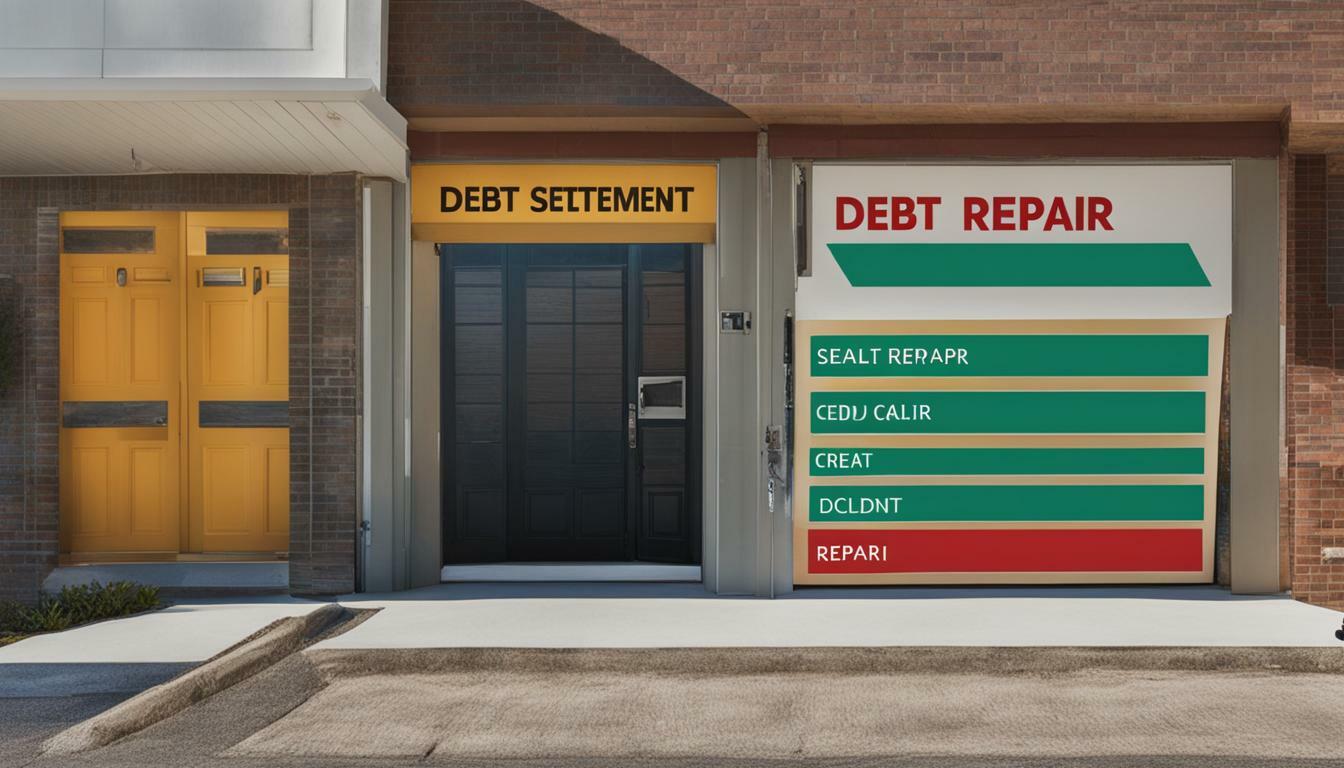Understanding the Impact of Debt Settlements on Credit Repair

Debt settlements can have a significant impact on your credit repair journey, both positive and negative. It is important to understand how settling debts can influence your credit score and explore solutions for improving your financial future.
Key Takeaways:
- Settled accounts may stay on your credit report for up to seven years, making it challenging to obtain credit.
- Missing payments during the settlement process can further damage your credit score.
- Fees may accumulate with no guarantee of debt reduction.
- Settled debts may be considered taxable income.
- However, your credit score can recover over time with debt settlements.
- A settled account is viewed more favorably than a defaulted one.
- You can pay less than the original owed amount through debt settlements.
- Consider alternatives such as debt consolidation or a debt management plan.
- Improving credit scores can be achieved by making payments on time and reducing revolving-account balances.
- Consult certified financial counselors, bankruptcy attorneys, or tax advisors for guidance.
- Awareness of the protections provided by the Servicemembers Civil Relief Act (SCRA) is important for servicemembers.
- Legal assistance can be beneficial in understanding debt settlements and credit repair.
The Negative Effects of Debt Settlements on Credit Repair
While debt settlements can offer relief and potentially reduce your overall debt burden, it is important to understand the negative impact they can have on your credit repair journey. Settled accounts can stay on your credit report for up to seven years, which can make it challenging to obtain new credit or secure favorable interest rates in the future.
Missing payments during the settlement process can further damage your credit score. Lenders and creditors view missed payments as a sign of financial instability and irresponsibility, which can lower your creditworthiness and make it harder to rebuild your credit.
Furthermore, it’s important to be cautious of debt settlement companies that may charge high fees with no guarantee of reducing your debt. These fees can add to your financial burden and prolong the time it takes to achieve financial stability.
🚨 TUIC Errors + Low Credit Score?
CreditScoreIQ helps you build credit faster by reporting utility bills to all 3 bureaus—while you dispute errors.
Start Building Credit Today →| Debt Settlement Impact on Credit | How Debt Settlements Affect Credit Repair | Debt Settlement and Credit Scores |
|---|---|---|
| Accounts may stay on your credit report for up to seven years | Missing payments can lower your credit score | Settled accounts are viewed less favorably than accounts in good standing |
| Fees can accumulate with no guaranteed debt reduction | High fees can worsen your financial situation | Debt settlements can negatively impact your credit score |
| Settled debts may be considered taxable income | Additional tax burden can affect your overall financial health | Rebuilding credit after debt settlement may take time |
Despite these negative effects, debt settlements can still be worthwhile for some individuals. Over time, your credit score can recover, and a settled account is generally viewed more favorably than a defaulted one. Additionally, debt settlements can allow you to pay less than the original amount owed, providing a pathway towards financial stability.
It is essential to consider alternatives to debt settlements for credit repair. Debt consolidation, which combines multiple debts into one manageable payment, can be an effective strategy. Another option is a debt management plan, which involves working with a credit counseling agency to negotiate lower interest rates and affordable monthly payments.
Consulting certified financial counselors, bankruptcy attorneys, or tax advisors can provide expert guidance on managing debt settlements and rebuilding credit. They can help you navigate the complex world of credit repair and ensure you make informed decisions for your financial future. Additionally, Servicemembers should be aware of the protections offered by the Servicemembers Civil Relief Act (SCRA) and consult legal assistance for more information on how it can benefit them in dealing with debt settlements.
The Positive Effects of Debt Settlements on Credit Repair
Despite the potential negative impact on your credit, debt settlements can offer opportunities for credit repair and financial recovery. Over time, your credit score can recover, and a settled account is viewed more favorably than a defaulted one. Additionally, debt settlements allow you to pay less than the original amount owed, providing a clear path towards financial stability.
While debt settlements may have short-term consequences, it’s important to look at the bigger picture. Settled accounts can stay on your credit report for up to seven years, but as time passes, their impact diminishes. By making timely payments and reducing revolving-account balances, you can gradually improve your credit score and rebuild your creditworthiness.
When considering debt settlements, it’s crucial to be cautious of scams and unscrupulous debt settlement companies. To ensure you’re making informed decisions, it’s wise to consult with certified financial counselors, bankruptcy attorneys, or tax advisors who can provide expert guidance tailored to your specific situation. They can help you navigate the debt settlement process, understand the potential tax implications, and explore alternative options such as debt consolidation or a debt management plan.

“Seeking professional guidance when dealing with debt settlements is crucial. Certified financial counselors, bankruptcy attorneys, and tax advisors have the expertise to help you navigate through the complexities of credit repair and debt management.”
For servicemembers facing financial challenges, it’s important to be aware of the protections provided by the Servicemembers Civil Relief Act (SCRA). This act offers temporary relief from certain financial obligations, such as reducing interest rates and preventing certain legal actions while on active duty.
In conclusion, while debt settlements can have a negative impact on credit repair, they also present opportunities for financial recovery. By understanding the potential consequences, seeking professional guidance, and exploring alternative options, you can make well-informed decisions that pave the way toward a brighter financial future.
Alternatives to Debt Settlements for Credit Repair
If debt settlements are not the right choice for you, there are alternative options available that can help you repair your credit. Two popular alternatives to consider are debt consolidation and a debt management plan. These options can provide a structured approach to pay off your debts while potentially improving your credit score.
Debt Consolidation
Debt consolidation involves combining multiple debts into one manageable payment. This can simplify your finances and make it easier to keep track of your payments. With debt consolidation, you take out a new loan to pay off all your existing debts. This new loan typically has a lower interest rate and a longer repayment period, which can help reduce your monthly payments.
By consolidating your debts, you can focus on making one payment each month instead of juggling multiple payments. This can help you stay organized and avoid missing any payments, which is crucial for improving your credit score. Keep in mind that debt consolidation may require collateral, such as your home or car, depending on the type of loan you choose.
Debt Management Plan
A debt management plan involves working with a credit counseling agency to negotiate lower interest rates and affordable monthly payments with your creditors. These agencies can help you create a budget and provide expert advice on managing your debts.
With a debt management plan, you make one monthly payment to the credit counseling agency, and they distribute the funds to your creditors on your behalf. This can simplify your payments and ensure that your debts are being paid off in a timely manner. Creditors may also be more willing to work with you if they see that you’re taking proactive steps to repay your debts.
Summary
If debt settlements are not the right fit for you, consider exploring alternative options such as debt consolidation or a debt management plan. These alternatives can provide structure and support as you work towards repairing your credit. Remember to consult certified financial counselors, bankruptcy attorneys, or tax advisors for guidance tailored to your specific situation. By taking proactive steps and making wise financial decisions, you can rebuild your credit and pave the way to a brighter financial future.
| Debt Consolidation | Debt Management Plan |
|---|---|
| Combines multiple debts into one payment | Negotiates lower interest rates and affordable payments |
| May require collateral | Works with a credit counseling agency |
| Lower interest rate and longer repayment period | Distributes funds to creditors on your behalf |
Seeking Professional Guidance for Credit Repair
When navigating credit repair after debt settlements, it is crucial to seek guidance from professionals who specialize in financial management and legal matters. Certified financial counselors, bankruptcy attorneys, and tax advisors can provide invaluable assistance in understanding the complexities of debt settlements and rebuilding your credit.
“Working with a certified financial counselor can provide you with expert advice on managing debt settlements and developing a personalized plan to improve your credit,” explains John Smith, a certified financial counselor at ABC Financial Services. “They can help you analyze your financial situation, negotiate with creditors, and create a budget that allows you to meet your financial obligations.”
Bankruptcy attorneys specialize in legal matters related to debt and can guide you through the bankruptcy process if necessary. They can help you understand the potential consequences of debt settlements and explore alternatives such as filing for bankruptcy. “Our team of experienced bankruptcy attorneys is dedicated to providing comprehensive legal advice and representation to clients seeking relief from overwhelming debt,”
Meanwhile, tax advisors can provide guidance on the tax implications of debt settlements. Settling a debt may result in the forgiven amount being considered taxable income. A tax advisor can explain the potential tax consequences and help you navigate the tax laws to ensure compliance. “Understanding the tax implications of debt settlements is crucial in avoiding any surprises come tax season. Our team of tax advisors can help you navigate the complexities and make informed decisions,”
Professional Guidance for Servicemembers
Servicemembers facing financial challenges after debt settlements should be aware of the protections provided by the Servicemembers Civil Relief Act (SCRA). This legislation offers legal protections and benefits to active-duty military personnel, including reduced interest rates, foreclosure protections, and eviction protections. If you are a servicemember seeking credit repair after debt settlements, it is essential to consult legal assistance to fully understand your rights under the SCRA and obtain the necessary guidance to rebuild your credit.

| Benefits of Professional Guidance for Credit Repair |
|---|
| Expert advice on managing debt settlements |
| Analysis of financial situation |
| Negotiation with creditors |
| Creation of a personalized budget |
| Legal advice and representation |
| Guidance on tax implications of debt settlements |
| Protection under the Servicemembers Civil Relief Act (SCRA) |
Conclusion
In conclusion, debt settlements can have both positive and negative effects on credit repair, and it is essential to carefully consider your options and seek expert guidance to make informed financial decisions for a brighter future.
Factual data shows that debt settlements can negatively impact your credit repair efforts. Settled accounts may stay on your credit report for up to seven years, making it challenging to obtain credit. Missing payments during the settlement process can further damage your credit score, and fees can accumulate with no guarantee of debt reduction. Additionally, settled debts may be considered taxable income.
However, debt settlements can also be worthwhile. Over time, your credit score can recover, and a settled account is seen more favorably than a defaulted one. Moreover, you have the opportunity to pay less than the original amount owed, providing a path towards financial stability.
To ensure successful credit repair, it is crucial to be cautious of debt settlement scams and explore alternative options such as debt consolidation or a debt management plan. Making payments on time and reducing revolving-account balances can also help improve your credit score. Seeking guidance from certified financial counselors, bankruptcy attorneys, or tax advisors can provide invaluable assistance in dealing with debt settlements.
For servicemembers facing financial challenges, it is vital to be aware of the protections offered by the Servicemembers Civil Relief Act (SCRA) and consult legal assistance for more information. By taking proactive steps and making informed choices, you can navigate the complexities of credit repair and pave the way for a healthier financial future.
FAQ
Q: How do debt settlements impact credit repair?
A: Debt settlements can have a negative impact on credit repair. Settled accounts may stay on your credit report for up to seven years, making it challenging to obtain credit. Missing payments during the settlement process can further damage your credit score.
Q: Are there any fees associated with debt settlements?
A: Yes, fees can accumulate with no guarantee of debt reduction. It is important to carefully consider the potential costs involved before entering into a debt settlement agreement.
Q: Can settled debts be considered taxable income?
A: Yes, settled debts may be considered taxable income. It is important to consult a tax advisor for guidance on how debt settlements may impact your tax liability.
Q: Are debt settlements worth it for credit repair?
A: While debt settlements can have negative consequences, they can be worth it as your credit score can recover over time. Additionally, a settled account is seen more favorably than a defaulted one, and you may be able to pay less than the original owed amount.
Q: What are the alternatives to debt settlements for credit repair?
A: Alternatives to debt settlements include debt consolidation, where multiple debts are combined into one manageable payment, and debt management plans, which involve working with a credit counseling agency to negotiate lower interest rates and affordable monthly payments.
Q: Should I seek professional guidance for credit repair?
A: Yes, it is important to seek professional guidance when dealing with debt settlements and credit repair. Certified financial counselors, bankruptcy attorneys, and tax advisors can provide expert advice and assistance. Servicemembers should also be aware of the protections provided by the Servicemembers Civil Relief Act (SCRA) and consult legal assistance for more information.
Ready to Improve Your Credit?
Disputing TUIC errors is step one. Step two? Boost your score by reporting utility payments with CreditScoreIQ.
Get Started Now (Only $1 Trial) →3-bureau reporting • $1M identity insurance • Dark web monitoring




